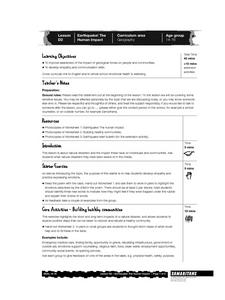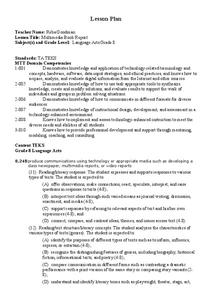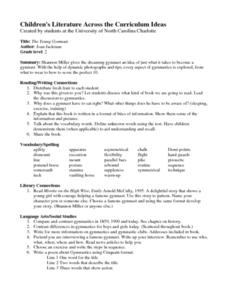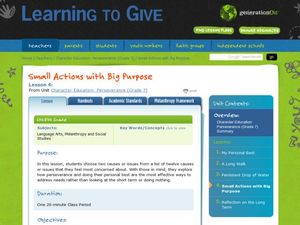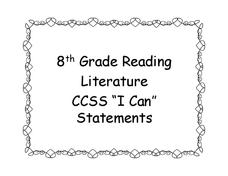Curated OER
If You Lived at the Time of the Civil War.
Students investigate major characters of history that are represented in children's literature. They conduct research using a variety of resources and each character is put into a class book as a presentation. The character includes a...
Curated OER
Earthquake! The Human Impact
Students explore the impact of natural disasters on communities. In this character education lesson, students examine poetry regarding an earthquake. Students discuss how to rebuild communities in the wake of natural...
Curated OER
Silly Story Starters
Fifth graders brainstorm some ideas for each of the columns. As they call them out, write some on the sticky notes until each sticky note is used for each column They stay in the same groups; have each group draw one sticky note from...
Curated OER
Multimedia Book Report
Young readers plan and draft a book report focusing on the five key components of a novel: plot, character, setting, conflict, and theme. After completing a story board, pupils then prepare a PowerPoint book report that is shown to the...
Curated OER
Paradise Lost: Anticipation Guide
To set the stage for reading Paradise Lost, class members compete an anticipation guide containing statements that connect to themes in Milton's epic poem.
Curated OER
The Young Gymnast
Second graders compare and contrast gymnastics in 1859, 1900 and today. Students contrast differences in gymnastics for boys and girls today. Students pretend that they are interviewing a famous gymnast and write up their interview....
Curated OER
How We Feel
Students examine how their feelings make them unique. They read and discuss a poem, develop a list of feelings, and create a drawing of them feeling happy and healthy.
Curated OER
Charlie and the Chocolate Factory
Fourth graders research and write an author report on Roald Dahl, including books written by him, birthplace, family life, and other information on his writing. Students read aloud chapters in the book. Students create a newspaper...
Curated OER
My Name Is Me!
Students write about themselves. In this personal writing lesson, students write their name vertically down a sheet of paper and think of a self descriptive word that matches each letter of their name. Students write a descriptive...
Curated OER
Character Education-Perseverance
Students learn what it means to stick to a task through the re-telling of the story, "The Little Engine That Could." Personal application is made to their own experiences with the completion of, "I think I can..." endings.
Curriculum Corner
7th Grade ELA Common Core Checklists
Track your class's progress on all of the ELA Common Core standards with these handy charts. Along the left side, each seventh grade identifier is listed along with the full text of the standard. As you teach, reteach, assess,...
Curriculum Corner
8th Grade ELA "I Can" Statement Posters
Eighth grades can master the ELA Common Core standards! Show your learners the connection between classroom activities and assignments and the standards with this set of "I Can" statement posters. Each standard has been rewritten as an...
Curriculum Corner
8th Grade ELA Common Core Checklists
How close are your eighth graders to mastering the ELA Common Core standards? Keep an eye on progress with these charts, which include every eighth grade identifier and full standard text. As you move through the year and teach,...
EngageNY
Making a Claim: Moon Shadow’s Point of View of the Immediate Aftermath
Body paragraphs are the building blocks of every essay. Pupils view and discuss a model essay using a rubric to evaluate one of its supporting paragraphs. Next, scholars use what they've learned to continue drafting their own literary...
Curated OER
Introducing Literary Elements in Fiction
Identify literary elements in fiction. In this reading comprehension lesson, learners read the book Pigsty and record literary elements onto a graphic organizer. They specifically discuss the main characters and events in the text.
Curated OER
CREATE A NEW RHYME
Third graders develop basic narratives. They retell a focused story and create a basic publication using available resources (e.g., pictures, colors, computer, copier). They experiment with different forms of creative writing (e.g.,...
Curated OER
Browning's "My Last Duchess" and Dramatic Monologue
Students read and analyze the poem, "My Last Duchess," by Robert Browning. They examine the use of dramatic monologue as a poetic device, and write a character profile of the Duke.
Curated OER
Chinese Calligraphy
Learners explore Chinese calligraphy. In this art and social science lesson, students copy the Chinese character ideograms in order to create words or phrases.
Curated OER
Lord of the Rings: The Quest is Achieved
Students analyze what makes a hero in The Lord of the Rings, Book Six. They discuss the characters and the aspects of their behaviors that make them heroes and write essays regarding the climax and heroic gestures of a character. After...
Curated OER
Best Part of Me
Students find the best part of their body. In this positive self-concept lesson, students listen to the story The Best Part of Me. They come up with their best feature and write a poem about it.
Curated OER
King Arthur: Man or Legend
Learners research the Legend of King Arthur. In this King Arthur lesson, students explore him as he is presented in stories, poems, and art. Learners compare and contrast the real life of King Arthur versus the man in...
Curated OER
What is a Hero? Heroism in Greek Mythology
High schoolers explore the tales of Greek mythology and discuss what it means to be a hero. They associate acts of epic heroism with philanthropy noting that these characters acted in a larger than life manner to secure the common good.
Curated OER
Cyrano de Bergerac Nose His Terms
Students use the play "Cyrano de Bergerac" to identify and analyze drama vocabulary, literary terms and elements of fiction. They write an original version of scenes from the play and develop a character analysis for the lead.
Curated OER
Mythical Beasts
Students explore literature and art forms containing creatures that are part human and part animal, such as the Greek Sphinx, Neptune, or the Green Centaur. Individually, students write a poem or short story to create a character with...



